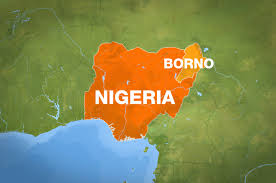Breaking News
Update: 43 bodies recovered as Boko Haram terrorists slit throats of Borno farmers

At least 43 farmers have been killed in a terrorist attack in Jere council area of Borno on Saturday, multiple sources in Maiduguri confirm to NewsWireNGR.
Local hunters involved in search operations have retrieved 43 bodies of farmers found dead, with their throats slit.
Maiduguri, the capital of Borno State, has been the epicentre of key events and changes in northeast Nigeria during the last decade.
After the arrival of the bodies, sources say, residents, are insisted they would not be buried until the state governor arrived Zabarmari where the massacre happened, Zabarmari is an area, located Jere LGA, approximately 20 km from the garrison city of Maiduguri.
The city witnessed the birth of Boko Haram, subsequent years of violence, as well as the arrival of more than 300,000 internally displaced persons (IDPs) fleeing their villages that were being attacked.
Informal and formal IDP camps have sprung up around the city, repurposing old government grounds, abandoned lots and real estate to give shelter to those fleeing.
The state government is yet to comment on the Saturday’s incident. Since September, the government began relocating residents displaced in the capital Borno to their towns of origin.
More than 2.7 million people have been displaced by Boko Haram terrorism in the region, according to a UNHCR report.
Many are farmers, as nearly 80 percent of Nigeria’s northern population works in the agriculture industry.
With an increase in Boko Haram attacks and the displacement of nearly two million Nigerians, agricultural production has plummeted and staple food prices have sky-rocketed.
NewsWireNGR had earlier reported and recalled that, Since 2011, Boko Haram—one of the largest Islamist militant groups in Africa—has conducted terrorist attacks on religious and political groups, local police, and the military, as well as indiscriminately attacking civilians in busy markets and villages.
The kidnapping of over two hundred girls from their school in April 2014 drew international attention to the ongoing threat from Boko Haram and the government’s inability to contain it. Following negotiations between Boko Haram and the Nigerian government, brokered by the International Committee for the Red Cross, 103 girls have since been released.
About 57 per cent of all schools are closed in Nigeria’s Borno state, worst hit by the Boko Haram insurgency and the subsequent humanitarian crisis, leaving an estimated 3 million children in need of emergency education support, according to the United Nations.
Since 2009, over 2,295 teachers have been killed and 19,000 have been displaced across the northeast. Almost 1,400 schools have been destroyed with the majority unable to open because of extensive damage or because they are in areas that remain unsafe.
The use of children as human bombs has sown a climate of mistrust among communities in the northeast, and a cholera outbreak has affected more than 3,900 people, including over 2,450 children.
kindly donate to the work we do using our interim PAYPAL https://www.paypal.me/NewsWireNGR






